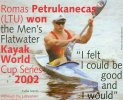"I felt I could be good and I would"
Romas Petrukanecas (LTU) won the Mens Flatwater Kayak World Cup Series 2002

Data Source Canoeing International - (Offical Magzine of the International Canoe Federation) - April-2002, Athletes (page 15-17) [more]
Although the Lithuanian Romas Petrukanecas has plenty of muscle, he exemplifies the fact that it is not only the big guys who can reach the top in solo kayaking. It is a matter of efficient technique, strength, willpower and proper training. Romas, a former gymnast, launched his kayak career at age 10 and worked long and hard for 19 years before winning the men's World Cup kayak title in 2002.
He
started to compete at 13 and has been a medallist in every national competition
in K1, K2 and K4 events, although he has had to overcome many hurdles
to continue his kayaking career. First, his coach advised him to give
up kayaking because he seemed too small to have any kayak potential. Finally,
he was allowed to continue but coaches paid scant attention to him. Petrukanecas,
however, was determined to succeed, "I felt I could be good, and
I would". Fortunately he did not give up training.
His second problem came at the age of 17 when his heart rhythm became
irregular. Doctors advised him to give up all sports, but especially kayaking,
which requires high intensity training. But Petrukaneacas was determined
to continue, "I felt I could be good and I would". Again, fortunately,
he did not give up training.
The third setback in his career occurred around the time Lithuania separated
from the Soviet Union in 1991 but was not recognized as an independent
country for three years. Athletes could participate only in national competitions
and were barred from international events. This period was a difficult
one for canoeists, for no financial aid was available and they did not
have access to international standard paddles and boats. Romas was fortunate
in that he could count on help from his parents, for he was training full
time.
But Petrukanecas felt he was born for kayaking, "I felt I could be
good and I would". Again, he refused to throw in the towel. His first
appearance in international competition was in the 1994 World Cup when
he was in 12th place in the 200m final ranking. For the next five years
he basically maintained this position, until in 1999 things began to change.
"Why did your results improve so dramatically from 2000?"
"Because after 1999 the best athletes began receiving government
support. We were given access to the latest boats and paddles as well
as financial support for living and traveling expenses. Another reason
was that after 1999 we were able to train for part of the year in Israel
which gave us a longer season. For that we must thank the Israeli Canoe
Federation and the coach Daniel."
"Could you tell me about your training routine?"
"A group of four or five people work together in every training session.
Thus, most of our training consists of competition within the group, whether
at paddling, running or lifting weights. I paddle twice a day, 11-12 times
a week. To enhance my performance I do meditation exercises as well. They
help me to bear the hard training sessions and give me the power to go
just that bit further."
"You specialize in 200m events. Do you need special training to
develop speed?"
"Not really! We do the same training as those who race in 1000m or
500m events. We also do a lot of aerobic endurance exercises at the start
of each season. My own special speed training consists of doing about
10-15 strokes at maximum effort with a rest in between."
"You seem very muscular. What is your maximum weight on the bench
press?"
"I can hoist 150 kg."
"How do you build up your strength?"
"The fact is that use the training programs that we found in your
book "Racing Canoeing". I do weight training 3-4 times a week
in-season and every day out of season."
"What is your opinion of the system used in the World Cup series?"
"I believe national federations have no great interest in spending
money to take part in the World Cups, especially not in all five or six
rounds. Also, World Cup dates often don't fit in with national federation
local or regional competitions. Athletes are not motivated to compete
in all the World Cups. Furthermore, the ICF awards money prizes only to
the first three athletes in each category and most of us are not funded
by our own national federations. Neither do we receive funding from organization
committees to help with expenses etc. We just receive the medals!"
"What would you suggest to improve the World Cup organisation?"
"It would increase motivation if award money were given, for example,
to the first six athletes in each categories instead of the first three.
Also, the national federation host should provide free rental boats, lodging
and some pocket money for the 5-10 best-ranked athletes. The best athletes
should be invited by name and informed of competition conditions.